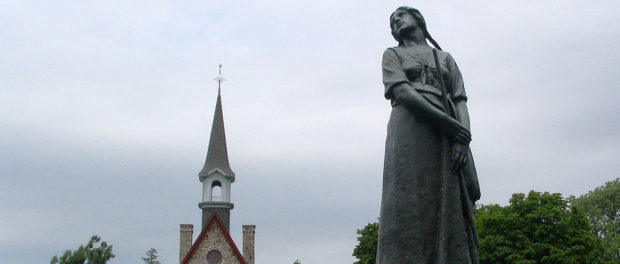1755: Evangeline’s People & Other Quebec Curios
Part of “Je me souviens: New France, 1534–1763”
 Statue of the literary figure "Evangeline" in Grand Pré, Nova Scotia, a character based on the plight of the Acadians. Photo credit: Dr Wilson/Wikimedia Commons.
Statue of the literary figure "Evangeline" in Grand Pré, Nova Scotia, a character based on the plight of the Acadians. Photo credit: Dr Wilson/Wikimedia Commons.
Just about any Quebec history book will have at least a section dedicated to Acadia (Acadie), the former French colony fell under British rule following the 1713 Treaty of Utrecht. The ultimate decision by the British to get the rebellious Acadians out of their way, resulting in the deportation of a nation and a culture was most notably immortalised into the popular consciousness a century later in Longfellow’s highly romanticised poem “Evangeline” (1847).
While under French control, Acadians were nonconformists, freely and happily trading with English colonists and generally living in harmony (and even intermarrying) with the Wabanaki Confederacy, a group of Algonquin tribes responsible for the oversight of the five major Native American communities in the area. Following Acadia’s passing into British control, the British actually had little to do with Acadia for a few decades. The French had even set up a fort and port located in a part of Acadia called Louisbourg. The Protestant British tried to enforce a pledge of allegiance of sorts to Britain, but the Catholic Acadians would only pledge neutrality, which vexed the British and Acadia’s English Governor, but was nonetheless tolerated. However, the last straw for a semi-peace in Acadia between the First Nations, French, and British in the area came at the British loss of Louisbourg in 1748 after their success at taking it over just a few years earlier in 1745.
In 1748, following the Treaty of Aix-la-Chapelle (a treaty that, unlike Utrecht, would actually end the conflicts of the War of the Spanish Succession), the French tried to coerce the Acadians back to their side, but the Acadians, tired of being bounced back and forth between French and British rule, refused, at least officially. The British, mindful that there would be rebel Acadians ready and willing to join the French side, increased military presence in major Acadian centres and set up their official trading area and colonisation attempts in Halifax (present-day Nova Scotia). Halifax was far away from Acadian settlements, but it was not pleasing to the increasingly antagonistic Mi’kmaq, one of the five peoples in the Wabanaki Confederacy, who were excluded from territorial talks between the British and the Confederacy and thus claimed Halifax territory as their own territory. Increasing resentment towards the British from the Acadian population, exasperated by the arrival of diseases, food crop failure, and influence by priests such as Jean-Louis Le Loutre, led to outright oaths of loyalty to France.
The British, sensing a threat from these oaths, and the threat augmented by the French construction of Fort Beausejour in 1751 (present-day New Brunswick), literally a boat ride across from British Acadia. Acadians stubbornly relented and swore a pledge of allegiance to England, but Acadia’s governor, Charles Lawrence, sensed the hesitation, and deported the Acadians. New England states, complicit with Lawrence’s plan, became the home to Acadians who hadn’t managed to flee. Historians now suggest that three quarter of Acadia’s population were deported to the Thirteen Colonies. As part of an ostracised community, many of these Acadians fled to French-occupied Louisiana, where their descendants, Cajuns (a corruption of the word Acadien), influence much of Louisiana’s culture today.
Read Henry Wadsworth Longfellow’s poem “Evangeline” here.





